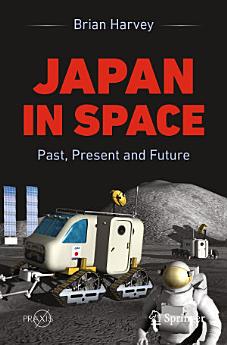Japan In Space: Past, Present and Future
Nov 2023 · Springer Nature
Ebook
421
Pages
reportRatings and reviews aren’t verified Learn More
About this ebook
Guided by genius engineer Hideo Itokawa, Japan’s space program began with small scientific satellites more than 50 years ago. Since then, its space probes have travelled to the Moon, Venus, the asteroids and even a comet. The country launched weather satellites to warn of typhoons, communications satellites to connect the Japanese archipelago and remote sensing technology to observe the Earth and warn of climate change. Engineering technology satellites became the basis of Japan’s electronic industry as Japanese astronauts flew into space, working on their Kibo module on the International Space Station.
Now, Japan is one of Asia’s leading space powers, alongside China and India, vying for influence in the region. Its solid and liquid-fueled rockets are estimated to be among the most advanced and reliable in the world, its technology among the best. This book examines the history of Japan’s space program, the country’s current state of development and its future. It describes the extensive infrastructure that has gone into the forging of Japan’s picturesque oceanside launch sites, training centers, testing facilities and tracking stations. This book also outlines the politics of space in Japan, financial difficulties, its space industry, the symbiotic relationship with the United States and the recent sharp change-of-course to invest in military satellites.
From the role of influential personalities, such as Hideo Shima and Shinichi Nakasuka, to political leaders, such as Yasuhiro Nakasone and Takeo Kawamura, you will read about how Japan has paved its own star-lit path to space. The future may expect to send Japanese probes to Mercury and the moons of Mars, all while the first Japanese astronauts set foot on our own Moon and drive innovative rovers across its surface.
Now, Japan is one of Asia’s leading space powers, alongside China and India, vying for influence in the region. Its solid and liquid-fueled rockets are estimated to be among the most advanced and reliable in the world, its technology among the best. This book examines the history of Japan’s space program, the country’s current state of development and its future. It describes the extensive infrastructure that has gone into the forging of Japan’s picturesque oceanside launch sites, training centers, testing facilities and tracking stations. This book also outlines the politics of space in Japan, financial difficulties, its space industry, the symbiotic relationship with the United States and the recent sharp change-of-course to invest in military satellites.
From the role of influential personalities, such as Hideo Shima and Shinichi Nakasuka, to political leaders, such as Yasuhiro Nakasone and Takeo Kawamura, you will read about how Japan has paved its own star-lit path to space. The future may expect to send Japanese probes to Mercury and the moons of Mars, all while the first Japanese astronauts set foot on our own Moon and drive innovative rovers across its surface.
About the author
Brian Harvey has been a writer and broadcaster on spaceflight since the early 1970s. His articles have appeared in Spaceflight, Space Chronicle, Quest, Orbit, Astronomy & Space, Go Taikonauts! and ROOM. He has contributed to radio programs on BBC (Radio 4, Radio 5, World Service, Northern Ireland), Voice of American, Radio Free Europe, Future tense (Australia) and to television and film programs for the Canadian Broadcasting Corporation, Discovery Channel, Danish TV and China CCTV (Dialogue - ideas matter). His first book was a history of the Soviet space program (Ellis Horwood, 1988), with three subsequent editions; followed by histories of Soviet lunar exploration, Soviet planetary exploration, Russian space science, the American Explorer program as well as histories of the European, Japanese and Indian space programs (all published by Praxis, later Praxis/Springer). He has written four histories of China’s space program, the most recent also published in Chinese. He contributed chapters to Space Sleuths (Praxis, 2012) and a book on Yuri Galperin, published by the Academy of Sciences in Moscow (2012).
Rate this ebook
Tell us what you think.
Reading information
Smartphones and tablets
Install the Google Play Books app for Android and iPad/iPhone. It syncs automatically with your account and allows you to read online or offline wherever you are.
Laptops and computers
You can listen to audiobooks purchased on Google Play using your computer's web browser.
eReaders and other devices
To read on e-ink devices like Kobo eReaders, you'll need to download a file and transfer it to your device. Follow the detailed Help Center instructions to transfer the files to supported eReaders.







